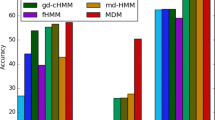Abstract
Multiple-resident activity recognition is a major challenge for building a smart-home system. In this paper, conditional random fields (CRFs) are chosen as our activity recognition models for overcoming this challenge. We evaluate our proposed approach with several strategies, including conditional random field with iterative inference and the one with decomposition inference, to enhance the commonly used CRFs so that they can be applied to a multiple-resident environment. We use the multi-resident CASAS data collected at WSU (Washington State University) to validate these strategies. The results show that data association of non-obstructive sensor data is of vital importance to improve the performance of activity recognition in a multiple-resident environment. Furthermore, the study also suggests that human interaction be taken into consideration for further accuracy improvement.
Access this chapter
Tax calculation will be finalised at checkout
Purchases are for personal use only
Preview
Unable to display preview. Download preview PDF.
Similar content being viewed by others
References
Wang, L., Gu, T., Tao, X., Lu, J.: Sensor-Based Human Activity Recognition in a Multi-user Scenario. In: Ambient Intelligence, pp. 78–87 (2009)
McCowan, L., Gatica-Perez, D., Bengio, S., Lathoud, G., Barnard, M., Zhang, D.: Automatic analysis of multimodal group actions in meetings. IEEE Transactions on Pattern Analysis and Machine Intelligence 27, 305–317 (2005)
Nguyen, N., Venkatesh, S., Bui, H.: Recognising Behaviours of Multiple People with Hierarchical Probabilistic Model and Statistical Data Association. Presented at the British Machine Vision Conference (2005)
Wilson, D.H., Atkeson, C.G.: Simultaneous Tracking and Activity Recognition (STAR) Using Many Anonymous, Binary Sensors. Presented at the Pervasive (2005)
Singla, G., Cook, D., Schmitter-Edgecombe, M.: Recognizing independent and joint activities among multiple residents in smart environments. Ambient Intelligence and Humanized Computing Journal (2009)
Lu, C.-H., Wu, C.-L., Fu, L.-C.: Hide and Not Easy to Seek: A Hybrid Weaving Strategy for Context-aware Service Provision in a Smart Home. Presented at the IEEE Asia-Pacific Services Computing Conference, Yilan, Taiwan (2008)
Kasteren, T.v., Noulas, A., Englebienne, G., Krose, B.: Accurate activity recognition in a home setting. Presented at the Proceedings of the 10th international conference on Ubiquitous computing, Seoul, Korea (2008)
Ye, J., Clear, A.K., Coyle, L., Dobson, S.: On using temporal features to create more accurate human-activity classifiers. Presented at the 20th Conference on Artificial Intelligence and Cognitive Science, UCD Dublin, Ireland (2009)
Chen, Y.-H., Lu, C.-H., Hsu, K.-C., Fu, L.-C.: Preference Model Assisted Activity Recognition Learning in a Smart Home Environment. Presented at the International Conference on Intelligent Robots and Systems, St. Louis, MO, USA (2009)
W.S. University: CASAS Smart Home Project, http://ailab.eecs.wsu.edu/casas/
Lafferty, J., McCallum, A., Pereira, F.: Conditional random fields: Probabilistic models for segmenting and labeling sequence data. Presented at the ICML (2001)
Vail, D.L., Veloso, M.M., Lafferty, J.D.: Conditional random fields for activity recognition. In: International Conference on Autonomous Agents and Multi-agent Systems (2007)
Lian, C.-C., Hsu, J.Y.-J.: Probabilistic Models for Concurrent Chatting Activity Recognition. Presented at the Proceedings of IJCAI-2009, Pasadena (2009)
Shewchuk, J.R.: An Introduction to the Conjugate Gradient Method Without the Agonizing Pain (1994)
Darroch, J.N., Ratcliff, D.: Generalized iterative scaling for log-linear models. Presented at the Annals of Mathematical Statistics (1972)
Nocedal, J.: Updating Quasi-Newton Matrices with Limited Storage. Mathematics of Computation 35, 773–782 (1980)
Kudo, T.: CRF++: Yet Another CRF toolkit (2007), http://crfpp.sourceforge.net/
Author information
Authors and Affiliations
Editor information
Editors and Affiliations
Rights and permissions
Copyright information
© 2010 Springer-Verlag Berlin Heidelberg
About this paper
Cite this paper
Hsu, KC., Chiang, YT., Lin, GY., Lu, CH., Hsu, J.YJ., Fu, LC. (2010). Strategies for Inference Mechanism of Conditional Random Fields for Multiple-Resident Activity Recognition in a Smart Home. In: García-Pedrajas, N., Herrera, F., Fyfe, C., Benítez, J.M., Ali, M. (eds) Trends in Applied Intelligent Systems. IEA/AIE 2010. Lecture Notes in Computer Science(), vol 6096. Springer, Berlin, Heidelberg. https://doi.org/10.1007/978-3-642-13022-9_42
Download citation
DOI: https://doi.org/10.1007/978-3-642-13022-9_42
Publisher Name: Springer, Berlin, Heidelberg
Print ISBN: 978-3-642-13021-2
Online ISBN: 978-3-642-13022-9
eBook Packages: Computer ScienceComputer Science (R0)




